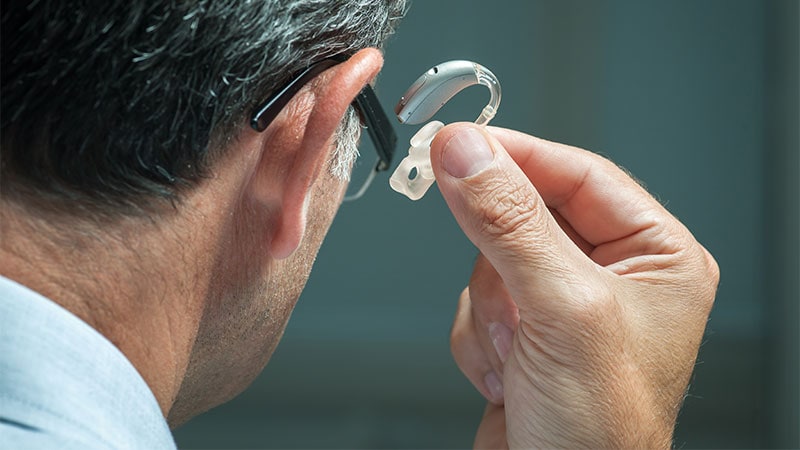Early hearing aid use is linked to an increased risk for dementia, new research has shown.
Results of a new observational study found that individuals aged 70 years or younger with hearing loss had a 61% lower risk for dementia than their counterparts with hearing loss who did not wear the aids.
“Only 17% of individuals with moderate-to-severe [hearing loss] use hearing aids. Our study underscores the importance of early intervention for [hearing loss] to reduce risk for incident dementia,” study investigator Lily Francis, MBBS, MPhil, University of Texas Health Science Center at San Antonio, and colleagues noted.
The study was published online on August 18 in JAMA Neurology.
Unique Research
Age-related hearing loss is widespread. The National Institute on Deafness and Other Communication Disorders estimates that 37.5 million Americans have some degree of hearing difficulty, and about 28.8 million could benefit from hearing aids.
The association between hearing loss and dementia is not new. Research shows that treating hearing loss — particularly with hearing aids — can slow cognitive decline and lower dementia risk for dementia in middle-aged and older adults. Among patients who already have dementia, those who use hearing aids experience fewer neuropsychiatric symptoms than those who do not.
However, this is the first study to show early intervention may play a role in reducing dementia risk, the researchers noted.
For the study, the investigators used data on dementia from 2953 participants from the Framingham Heart Study original and offspring cohorts who had at least mild hearing loss as measured by pure-tone audiometry. Participants had a mean age of 68.9 years, 59% were women, and 42% were aged less than 70 years during their hearing assessment.
The researchers compared incident dementia and hearing aid use across three models that adjusted for age and sex (model 1); age, sex, and Framingham Stroke Risk Profile (model 2); and age, sex, and education (model 3).
For participants with hearing loss who were aged less than 70 years at their hearing assessment, there was a 61% lower risk of developing incident all-cause dementia among those who wore hearing aids than participants who did not wear hearing aids (hazard ratio [HR], 0.39; 95% CI, 0.17-0.89; P = .03).
There was also a 21% lower risk of developing incident all-cause dementia for participants aged less than 70 years old at their hearing assessment who did not have hearing loss than those who did have hearing loss and did not wear hearing aids (HR, 0.71; 95% CI, 0.54-0.95; P = .02).
The likelihood of developing dementia was not significantly different in the model that considered the participants’ Framingham Stroke Risk Profile or education level.
The researchers found no significant differences in incident dementia risk for participants older than 70 years across any of the models, regardless of whether they experienced hearing loss or wore hearing aids.
Study limitations included reliance on participants’ self-reported hearing aid use, measured only with a binary response, which “does not capture the extent of use,” Francis and colleagues noted. The study also could not distinguish whether benefits were related to early intervention by age or by severity of hearing loss. In addition, researchers pointed out that participants who could afford hearing aids generally had better access to healthcare than those without them.
This study was supported by grants from the National Institute on Aging. The authors reported receiving university endowments and federal grants both during and outside of the study period.
